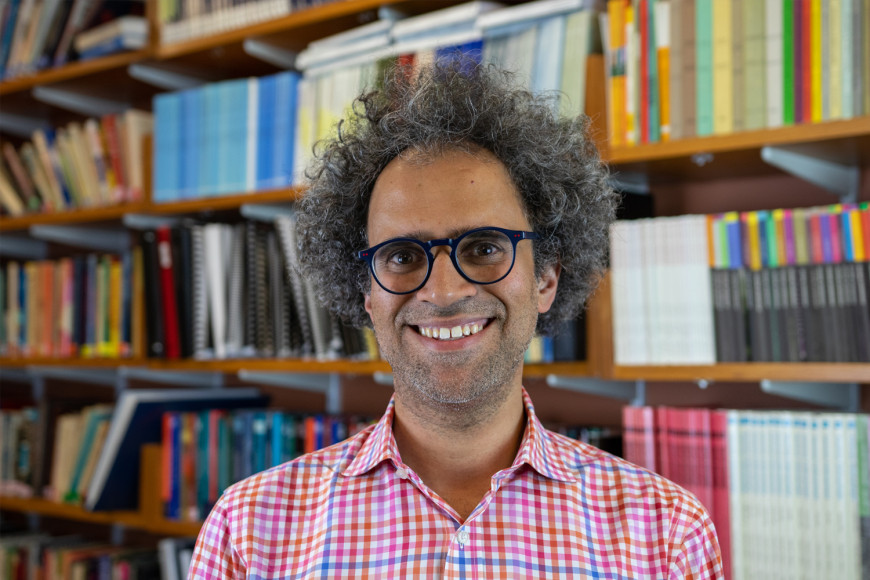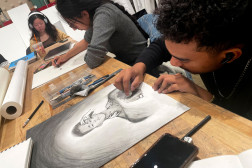Biography
I am a cultural and linguistic anthropologist who explores how people use language and other media to enact expertise in practice, performance, and interaction. After studying literature at Reed College (BA, 1998) and anthropology at New York University (PhD, 2007), I was a postdoctoral member of the Princeton Society of Fellows (2007-2010). My two monographs constitute a diptych: Trade of the Tricks: Inside the Magician's Craft (California, 2011) describes day-to-day life and everyday talk within the insular subculture of contemporary French illusionists; Magic's Reason: An Anthropology of Analogy (Chicago, 2017) examines the meaning of magic in Western modernity, shuttling between the intellectual history of anthropology and the cultural history of popular entertainment. Alongside these books, I have a third set of projects investigating how language and culture shape, and are in turn shaped by, the way people use technologies of digital communication. At MIT, I teach classes on a range of subjects, including: the anthropology of education; the language of mediated communication; and ethnographic research methods.
Research
I study how people use language and media to not only share knowledge, but also to imbue it with meaning and value - whether by colluding in shared secrets or staking out contrastive positions in an argument. Through ethnographic engagements with a wide range of communities of speech and practice, I analyze ways in which signifying practices shape moral and epistemological convictions. From the way sleight-of-hand magicians verbally regulate the circulation of technical secrets to the ways computer hackers communicatively coordinate software design projects and anthropologists construct arguments with analogies, my work spans diverse forms of expertise. It also attends to multiple scales, from the shared intimacies of a conversation between friends to debates in a sprawling and anonymous online discussion forum. I use the tools of linguistic anthropology to demonstrate how verbal strategies of encoding knowledge and producing evidence connect with complex social dynamics of identity and difference. My ethnographic and ethnohistorical research has focused primarily on metropolitan and colonial France, but I have also conduced research in the United States, China, Singapore, and Québec.
Selected Publications
| 2025 | Jones, Graham, Shai Satran, and Arvind Satyanarayan. 2025. “Toward Cultural Interpretability: A Linguistic Anthropological Framework for Describing and Evaluating Large Language Models (LLMs).” Big Data & Society 12(1): 1-13. |
| 2024 | Satyanarayan, Arvind, and Graham M. Jones. 2024. “Intelligence as Agency: Evaluating the Capacity of Generative AI to Empower or Constrain Human Action.” An MIT Exploration of Generative AI, March.https://doi.org/10.21428/e4baedd9.2d7598a2. |
| 2021 | “‘Let’s Go, Baby Forklift!’: Fandom Governance and the Political Power of Cuteness in China.” With Jamie Wong, Crystal Lee, Vesper Keyi Long, and Di Wu. Social Media + Society 7(2): 1-18. |
| 2021 | Viral Visualizations: How Coronavirus Skeptics Use Orthodox Data Practices to Promote Unorthodox Science Online. With Crystal Lee, Tanya Yang, Gabrielle Inchoco, and Arvind Satyanarayan. In CHI Conference on Human Factors in Computing Systems (CHI ’21), May 8–13, 2021, Yokohama, Japan. |
| 2017 | Magic's Reason: An Anthropology of Analogy. Chicago: University of Chicago Press. |
| 2015 | "There's No Rules. It's Hackathon.": Negotiating Commitment in a Context of Volatile Sociality. With Beth M. Semel and Audrey Le. Journal of Linguistic Anthropology 25(3): 322-345. |
| 2014 | Secrecy. Annual Review of Anthropology 43: 53-69. |
| 2012 | Magic with a Message: The Poetics of Christian Conjuring. Cultural Anthropology 27(2): 193-214. |
| 2011 | Trade of the Tricks: Inside the Magician's Craft. Berkeley: University of California Press. |
| 2010 | Modern Magic and the War on Miracles in French Colonial Culture. Comparative Studies in Society and History 52(1): 66-99. |
| 2009 | Enquoting Voices, Accomplishing Talk: Uses of Be + Like in Instant Messaging. With Bambi B. Schieffelin. Language & Communication 29(1): 77-113. |
| 2009 | Talking Text and Talking Back: "My BFF Jill" from Boob Tube to YouTube. With Bambi B. Schieffelin. Journal of Computer Mediated Communication 14(4): 1050-1079. |
Teaching
21A.00
Introduction to Anthropology: Comparing Human Cultures
Through the comparative study of different cultures, anthropology explores fundamental questions about what it means to be human. Seeks to understand how culture shapes societies, from the smallest island in the South Pacific to the largest Asian metropolis, and affects the way institutions work, from scientific laboratories to Christian mega-churches. Provides a framework for analyzing diverse facets of human experience, such as gender, ethnicity, language, politics, economics, and art.
21A.150
Teaching and Learning: Cross-Cultural Perspectives
Explores the diverse ways that people teach and learn in different countries, disciplines, and subcultures (computer gamers, magicians, jazz musicians, etc.). Compares schooling to other forms of knowledge transmission, from initiation and apprenticeship to recent innovations in online education. Students discuss various learning theories and apply them to a variety of in-class activities using qualitative methods to conduct original research on topics of their choice.
21A.157
The Meaning of Life
Examines how a variety of cultural traditions propose answers to the question of how to live a meaningful life. Considers the meaning of life, not as a philosophical abstraction, but as a question that individuals grapple with in their daily lives, facing difficult decisions between meeting and defying cultural expectations. Provides tools for thinking about moral decisions as social and historical practices, and permits students to compare and contextualize the ways people in different times and places approach fundamental ethical concerns.
21A.502
Fun and Games: Cross-Cultural Perspectives
Considers the cultural organization of play in different communities and societies. Explores why all people play, how different cultures experience fun, and what particular games mean, if anything. Surveys major theories of play in relation to a variety of play phenomena, such as jokes, video games, children's fantasies, sports, and entertainment spectacles. As a final project, students develop their own case study.
21A.503J / 24.913J / STS.070J
Language and Technology
Examines cultural impact of communication technologies, from basic literacy to cell phones, and computer-based social networks on patterns of verbal interaction. Introduces theories and methods of linguistic anthropology pertinent to technologies that make it possible for people to communicate across distances in space and time. Students develop their own research projects exploring the cultural dimensions of technologically enhanced communication. Enrollment limited.
21A.513
Drawing Human Experience
Introduces fundamental techniques of drawing with traditional media and their application as tools of anthropological inquiry. Examines what the human impulse to draw reveals about connections between mind, hand, and eye. Explores ideas, refines perceptions, and communicates insights through both abstract and figurative drawing. Each student completes a portfolio of original drawings with accompanying written analysis. Limited to 20 due to space constraints.
21A.520
Magic, Science, and Religion
Explores the origins of magic, science, and religion as forms of belief within and across cultures. Addresses the place of rationality and belief in competing sociocultural theories, with a focus on analyzing modern perspectives. Examines how cases of overlap between magic, science, and religion raise new questions about modernity and human nature.
21A.802
Seminar in Ethnography and Fieldwork
Introduction to ethnographic practices: the study of and communicating about culture. Subject provides instruction and practice in writing, revision of fieldnotes, and a final paper. Preference to Anthropology majors and minors.
21A.819J / 15.349J
Qualitative Research Methods
Training in the design and practice of qualitative research. Organized around illustrative texts, class exercises, and student projects. Topics include the process of gaining access to and participating in the social worlds of others; techniques of observation, fieldnote-taking, researcher self-monitoring and reflection; methods of inductive analysis of qualitative data including conceptual coding, grounded theory, and narrative analysis. Discussion of research ethics, the politics of fieldwork, modes of validating researcher accounts, and styles of writing up qualitative field research.
Awards
| 2023 | MITx Express Exploration Grant |
| 2023 | CAST Cross Disciplinary Class Development Grant, MIT |
| 2022 | Work of the Future Seed Fund Grant, MIT |
| 2022 | Bose Research Grant, MIT (with Arvind Satyanarayan) |
| 2021 | Fang Fund grant for interdisciplinary computing research |
| 2021 | Frank E. Perkins Award for Excellence in Graduate Advising |
| 2020 | Teaching with Digital Technology Award, MIT |
| 2019 | Margaret MacVicar Faculty Fellow |
| 2015 | Mellon Foundation, New Directions Fellowship |
| 2013 | National Science Foundation, "MOOCs and the Ethnography of Media Socialization" (award # BCS-1258640) |
| 2013 | Edgerton Award for Exceptional Distinction in Teaching and Research |
| 2012 | Levitan Award for Excellence in Teaching, MIT School of Humanities, Arts, and Social Sciences |
News
In the new interdisciplinary course 21A.513 (Drawing Human Experience), students look within themselves for artistic inspiration.
Article: Nicole Estvanik Taylor | Photo: Allegra Boverman | School of Humanities, Arts, and Social Sciences | MIT News
January 29, 2024
Graham Jones "Paranormal Machines" class featured in Arts at MIT Video "MIT CAST: Cross-Disciplinary Classes"
Arts at MIT Newsletter
February 9, 2023
MIT Anthropology's Prof. Graham Jones among 2022 Bose Grant awardees
Aaron Braddock | Office of the Provost | MIT News
June 13, 2022
Teaching With Digital Technology Award winners recognized for their innovations
MIT Open Learning
August 3, 2020
Links
"A magician’s imperial mission" (MIT News Office)





